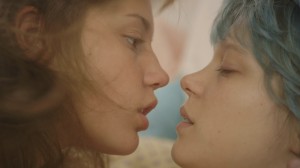 That first love – that first spark of lust – affects us so profoundly that we remember the ecstasy and the agony until our dying days. Abdellatif Kechiche‘s Palme d’Or winner Blue Is The Warmest Colour (La Vie d’Adele – Chapitres 1&2) is a French lesbian coming-of-age feature based on the 2010 graphic novel Blue Angel by Julie Maroh. It’s a film that illustrates the immense power of those first throes of desire and infatuation, submerging us into their emotional depths for a hefty three hours. It will not struggle to find its place amongst the strongest and most influential films of contemporary queer cinema (the other that springs to mind is British director Andrew Haigh‘sWeekend, a sensitive and near perfect portrayal of two young men falling quickly and deeply in love, you really must see it if you haven’t yet.)
That first love – that first spark of lust – affects us so profoundly that we remember the ecstasy and the agony until our dying days. Abdellatif Kechiche‘s Palme d’Or winner Blue Is The Warmest Colour (La Vie d’Adele – Chapitres 1&2) is a French lesbian coming-of-age feature based on the 2010 graphic novel Blue Angel by Julie Maroh. It’s a film that illustrates the immense power of those first throes of desire and infatuation, submerging us into their emotional depths for a hefty three hours. It will not struggle to find its place amongst the strongest and most influential films of contemporary queer cinema (the other that springs to mind is British director Andrew Haigh‘sWeekend, a sensitive and near perfect portrayal of two young men falling quickly and deeply in love, you really must see it if you haven’t yet.)The main focus is teenager Adéle (Adéle Exarchopoulos), a popular and intelligent girl with a fascination for literature and watching American movies, sans subtitles. It’s obvious she isn’t as boy-obsessed as her fellow comrades, oblivious to good looking male suitors who clearly admire her until it is explicitly pointed out. Pressurized by the relentless encouragement of her peers she starts a sexual relationship with handsome and lovesick Thomas (Jérémie Laheurte), but is tortured by her fantasies of blue-haired girl she spotted in the street. She feels there is something seriously wrong with her, and Kechiche does well at exploring the shame and guilt we place on ourselves for experiencing lust that doesn’t fit into society’s structured categorical norms. Adéle isn’t gay necessarily, but her budding bisexuality leaves her feeling isolated and abnormal. It’s admirable the way Blue Is The Warmest Colour frankly reflects the fluid nature of desire.
After a chance encounter in a gay bar with her blue haired crush Emma, (Léa Seydoux) a relationship blossoms. The scenes of their new and exciting passion and hunger for each other are sexually explicit, sure, but they are also tender. This is where the length of the film can really come into its own as it can charts not just the birth of romance but follows it through until the couple experience the daily drudgery of domesticity, doubts and wandering eyes. Kechiche studies the affects of a relationship after a number of indiscernible years; Emma is a successful painter, Adéle is a nursery school teacher, and they live together. Their romance isn’t perfect. Adéle is more comfortable preparing food than discussing the works of Jean-Paul Sarte with Emma’s cultivated intellectual circle, people who alienate and bore her. Kechiche playfully mocks the dialogue of French cinema when he has Adéle say “they talk about so much stuff”. The tensions that develop between the couple – their changing priorities and growing dissatisfaction – are honest of the flaws and contradictions in real adult relationships.
The performances are wonderful, particularly Adéle Exarchopoulos, who plays Adéle with a real rawness. Adéle is a character with a heightened emotional sensibility, easily affected, and spends much of the film with tears and mucus running down her face. Kechiche isn’t afraid to turn the drama up to the maximum level, but it’s always absorbing rather than sinking into ridiculous melodrama. Blue Is The Warmest Colour is a beautifully conducted, carefully considered exploration of the elation and torture of youthful infatuation.
This review comes from a screening at the 57th BFI London Film Festival 2013 (LFF 2013).

No comments:
Post a Comment